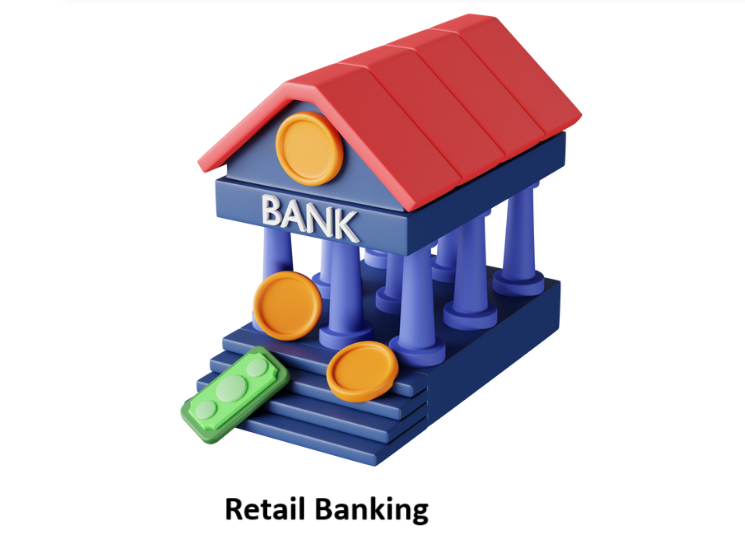In today’s fast-paced digital world, managing personal finances effectively is essential, and retail banking plays a pivotal role in this process. Whether it is opening a savings account, applying for a mortgage, or simply paying bills, retail banking offers a wide array of services designed to meet the financial needs of individuals and small businesses alike.
But what exactly is retail banking, and how does it function behind the scenes to make money management easier for millions of people? In this following blog, we will explore the key elements of retail banking, its purposes, and how it works to help customers achieve their financial goals with ease and convenience.
What exactly is Retail Banking?
Retail banking is a type of banking system provided to individuals or small businesses. It is also known as a consumer bank. Retail banks provide features like depositing money, card availability, interest on the deposited amount, and more. They serve individuals and families, offering a broad array of financial products and services designed to meet personal financial needs.
From simple savings and checking accounts to loans, credit cards, and mortgages, retail banking is the gateway to managing everyday finances. Retail banking aims to simplify money management, making it secure, accessible, and convenient.
Imagine walking into a branch or logging into your banking app to seamlessly deposit a check, transfer funds, or plan for your future. Retail banking makes it possible to build your financial foundation, whether you are saving for a rainy day, purchasing a home, or planning your retirement.
Also, Check the difference between Checking and Savings accounts
Key Takeaways
- Retail banking serves individuals and small businesses. It is also known as consumer banking.
- It provides essential financial services like depositing money, card availability, and interest or deposits.
- Retail banking offers a wide range of products, including savings accounts, checking accounts, loans, credit cards, and mortgages.
- It aims to simplify money management, making it secure, accessible, and convenient.
- It supports customers in building financial foundations, from saving for emergencies to planning retirement.
- Retail banking is accessible through both physical branches and digital platforms, enabling seamless transactions like check deposits and fund transfers.
Retail Banking Examples

Retail banking has a significant presence in India, offering a variety of services that cater to individuals and small businesses. From traditional banking services to innovative digital platforms, retail banking institutions in India offer a broad spectrum of products and services to meet the broad range of customer needs.
State Bank of India (SBI)
SBI is the biggest bank in India, owned by the Government of India. It provides savings accounts, fixed deposits, personal loans, and many other products and services. SBI has its own digital platform, the SBI YONO app for mobile banking, online banking for fund transfers, and many more.
HDFC Bank
HDFC Bank is a private sector bank that provides personal loans, car loans, savings and current accounts, and many other products and services. HDFC Bank’s mobile banking app and net banking offer comprehensive services, including investments, insurance, and wealth management.
Also, check out the Top 10 Wealth Management Companies in India
How does Retail Banking Work?

Retail banking works as a dynamic bridge between individuals and the financial system, providing essential services that simplify the management of personal finances.
When a customer opens an account, retail banking offers them a gateway to manage their daily finances. They can deposit funds, withdraw money, and make payments using various methods like debit cards or online transfers. Retail banks provide savings accounts where customers can grow their wealth, earn interest, and safeguard their future.
Retail banking is not limited to basic account management like withdrawing, saving, and other services. It provides tailored products such as personal loans, mortgages, and credit cards, enabling customers to borrow money for major life milestones, like buying a home or financing a business. Retail banking assesses an individual’s creditworthiness in these cases, then offers financing at competitive rates, guiding customers through repayment options that align with their financial health.
Retail banking also provides wealth management and investment services, helping individuals grow their wealth strategically. Customers can receive advice on investments, retirement planning, and insurance, benefiting from a comprehensive approach to securing their financial future.
What makes retail banking truly functional is its behind-the-scenes orchestration of financial transactions. Banks maintain vast, secure networks that connect them with payment systems, stock markets, and international financial institutions, ensuring every transaction is processed quickly and accurately.
In this way, retail banking works not only as a financial facilitator but as a trusted financial partner.
Recommended Course
Financial Services by Retail Banking System
Retail banking provides a number of financial services, including debit cards, bank accounts, bill payments, and seeking financial advice. A retail bank entails a comprehensive suite of financial services and products that cater primarily to individuals and small businesses. Its focus is on meeting the personal financial needs of everyday consumers.
Retail banking offers tools and services needed to manage personal finances efficiently, acting as a central hub for saving, spending, borrowing, investing, and safeguarding wealth. By blending physical branches with modern digital platforms, retail banks aim to make financial services as accessible and personalized as possible.
Some of the crucial services included in retail banks are mentioned below:
Deposit Accounts
Retail banks provide saving accounts that allow customers to store money securely while earning interest. It provides easy access to funds for daily transactions, bill payments, and debit card usage. Certificates of Deposit that offer higher interest rates in exchange for committing funds for a set period.
Credit Services
Retail banks provide credit services like personal loans, home loans, auto loans, and credit cards. A personal loan is an unsecured loan to fund personal expenses, such as home renovations or education. Home loans enable customers to purchase or refinance homes, with flexible repayment terms.
Auto loans are specifically designed to finance automobile purchases. Credit cards offer a revolving line of credit, allowing customers to borrow funds for purchases, repay over time, and often earn rewards.
Investment and Wealth Management
Retail banks provide investment advice and help in wealth management. Investment accounts assist customers in growing their wealth by providing access to stocks, bonds, mutual funds, and other financial instruments. Retirement planning includes individual retirement accounts (IRAs) and pension planning. Retail banking also provides financial advisory services that offer guidance on long-term wealth management, estate planning, and portfolio optimization.
Payment and Money Transfer Services
Bill payment service that allows users to pay utilities, loans, and other bills through online banking or in-branch. Fund transfers that enable quick and secure transfers of money between accounts, both domestically and internationally.
Digital payments and mobile banking that include mobile apps and online platforms allow seamless money management and transactions on the go.
Insurance and Protection
Retail banks provide insurance and protection. Life and health insurance, as retail banks often partner with insurance providers to offer protection plans. Home and auto insurance, as banks may provide insurance solutions to safeguard customers’ assets.
Fraud protection services to safeguard against unauthorized transactions and identify theft.
ATM Network
Retail banks provide ATM networks that give access to Automated Teller Machines (ATMs) for cash withdrawals, deposits, balance checks, and other essential services, available nationwide or globally.
Can Freshers Get Opportunities in Retail Banks?
Many retail banks in India offer freshers or recent graduates various entry level jobs to help them explore the work culture and make a difference. These entry level roles in banking prepare freshers for the challenging environment of work culture in private banks and also help them gain experience.
Retail banks like SBI, Kotak, ICICI, Axis, HDFC, and more provide a lot of entry level positions for freshers and young graduates.
Prepare for Jobs in the BFSI Sector with PW Skills
If you are looking to build your career in one of these dynamic sectors i,e. Banking, Financial, and Insurance then you can excel in your preparation and get in-depth knowledge in all three major sectors with our BFSI Course.
The course provides in-depth knowledge of banking and financial services, soft skills, and interview preparation, and after you complete course properly our experts will help you get thousands of job opportunities in these sectors. Receive industry recognised certification from PW Skills and flaunt your portfolio with pwskills.com
Retail Banking FAQs
Q1. What does a retail bank do?
Ans. Retail banking works as a dynamic bridge between individuals and the financial system, providing essential services that simplify the management of personal finances.
Q2. What services do customers expect from a retail bank?
Ans. Retail banking offers tools and services needed to manage personal finances efficiently, acting as a central hub for saving, spending, borrowing, investing, and safeguarding wealth. By blending physical branches with modern digital platforms, retail banks aim to make financial services as accessible and personalized as possible.
Q3. Give examples of Indian retail banks.
Ans. SBI, HDFC, ICICI, PNB, Axis, and Kotak Mahindra are some of the popular Indian retail banks.

